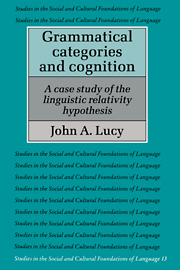3 - Cognitive assessment
Published online by Cambridge University Press: 19 January 2010
Summary
The objective of this chapter is to illustrate an approach capable of addressing whether or not different linguistic configurations of meaning produce cognitive consequences. This will be accomplished by seeking evidence that the linguistic patterns described in chapter 2 have correlates in cognition. If cognitive performance corresponds with linguistic structure in a distinctive way, the proposal that the specific structure of a language is related to thought gains support. As discussed in Language diversity and thought, chapter 7, it is not possible with correlational techniques to establish unequivocally that language is the shaping factor in such a relationship; the language patterns may in fact derive from culturally specific thought patterns, or both patterns may derive from some third cultural factor. But correlational evidence can be extremely suggestive of a causal role for language if the relationships are strong and distinctive and if no other explanation for the contrasting cognitive patterns seems plausible. It will be difficult to achieve conclusive results in a single study – especially when it is exploratory, as the present one is – and further work using additional assessment procedures and other linguistic and cultural groups will be needed to establish the reliability and generality of the present findings and to rule out plausible alternative explanations. Nonetheless, the results reported here are suggestive of some interesting and reliable relationships between linguistic patterns and habitual thought.
General approach
To find connections between language and thought, specific hypotheses concerning potential linkages must be formulated. The move from the linguistic forms of English and Yucatec to an assessment of possible psychological connections requires three analytic steps.
- Type
- Chapter
- Information
- Grammatical Categories and CognitionA Case Study of the Linguistic Relativity Hypothesis, pp. 85 - 148Publisher: Cambridge University PressPrint publication year: 1992



